


|
|
|
�THE future belongs to those who see what everybody has seen and think what nobody has thought,� says a catalogue on Gadre Marine Export Pvt. Ltd. As the country�s first base manufacturer of crabsticks and surimi analogue products, the Gadres must know what they are talking about.
Arjun Gadre, the second generation entrepreneur in the business, has studied manufacturing engineering and management from the University of Nottingham in England. Gadre Marine Export was started by his father Deepak Gadre in 1978 as a processing and packaging unit of frozen marine products such as shrimps, squid, cuttle fish and other fin fish. In 1994, the family started manufacturing and selling surimi. And very recently, the six value-added surimi products under the brand name �Just Like�. Meaning, the products are �just like� crab sticks, crab claws, crab flakes, lobster tails, shrimp tails and breaded batter crab claws, but are not really.
This white tasteless and odourless meat is then passed through a decanter that spins at 4,000 rpm to separate the meat from the water. The dry meat gets thrown out. It is fish meat with the water content of fresh fish but without the taste, smell, fat, colour, blood, enzymes, skin, bones, and scales.
Gadre Marine Export�s plant at Ratnagiri is designed with the most advanced equipment technology has to offer. It is fully fitted with central air handling and air-conditioning systems. They enforce strict hygiene control and have automatic handling and packaging that further eliminates the risk of contamination. Its technical staff are highly trained and experienced and cater to specific needs of texture, colour, taste and type. And it is constantly thinking ahead. R&D for the production of a fish sausage is almost complete. And Black Tiger shrimps are being farmed at another plant on the way to Ganapatipule so that shrimp may be supplied to the world.
He, and his charming wife Anjali, are fond of seafood. And while he admits that surimi cannot replace seafood in, say, a traditional culinary delicacy like Stuffed Crab, it has its uses. �Because its flavour and texture has been fabricated, it can be used anywhere in the world,� Arjun says. �While not in Stuffed Crab, for certain, it does taste fantastic in butter garlic sauce. Surimi products also go well with dips like Thousand Island and mayonnaise. The breaded batter crab claw is perfect as a starter.� Surimi products are widely used by hotel food and begerage managers in banquets, big parties and where the volume of food is going to be large. �It is a good ingredient, it has the same quality and effect,� Arjun maintains. India, unfortunately, has no market for these products. �The Indian psyche is to add masalas or fry it in a pan. And with surimi products you cannot do that. But no proper effort has as yet been made in India to start the product. We have no cold foods chain to distribute it. Gadre Marine Export intends to sell in it the future. Right now, we only have one shop that markets it in Goa.� The moot question, however, is whether the Indian tastebuds which are so accustomed to having fresh seafood would accept an imitation product. �If you say it is imitation, people will turn away. But use it like cheese in a salad. It has good shellfish taste without the cholesterol. It is not supposed to replace King Prawn or Crab, remember. Be innovative when using it. It is a novel item.� Gadre Marine Export Pvt. Ltd.
|

Home Page
About the mag
Subscribe
Advertise
Contact Us
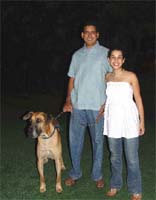 The Crab Maker
The Crab Maker
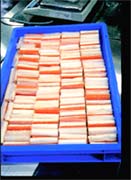 Surimi, very simply, means fish paste in Japanese. It is created through a traditional method of processing fish protein. The Japanese make thouands of products out of surimi. The Gadres make just six, they are crab sticks, crab claws, crab flakes, lobster tails, shrimp tails, and breaded batter crab claws.
However, these six products are exported to US, the UK, Australia, Greece, New Zealand, and Spain. And the surimi that the Gadres make in their 55,000 square feet factory at Ratnagiri�s MIDC area, goes to Japan, Taiwan, Korea, Australia and Malaysia. Talk about sending coal to Newcastle!
Surimi, very simply, means fish paste in Japanese. It is created through a traditional method of processing fish protein. The Japanese make thouands of products out of surimi. The Gadres make just six, they are crab sticks, crab claws, crab flakes, lobster tails, shrimp tails, and breaded batter crab claws.
However, these six products are exported to US, the UK, Australia, Greece, New Zealand, and Spain. And the surimi that the Gadres make in their 55,000 square feet factory at Ratnagiri�s MIDC area, goes to Japan, Taiwan, Korea, Australia and Malaysia. Talk about sending coal to Newcastle!
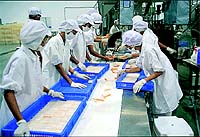 �They are surimi products,� explains Arjun, �they don�t replace the traditional items. Crab sticks started the imitation trend. But now a stage has been reached where these imitation products have their own market segment.�
To understand the business, you must first understand what surimi is and how it is created. Arjun says that Gadre Marine Export gets 250 metric tonnes of fresh fish from fishermen along the west coast every day. They are everywhere, from Okha to Ratnagiri, occasionally Gadre even takes fish from Visakhapatnam. �It comes to our factory without the head and gut. Only the body is used by us. We supervise the cutting,� he explains. Gadre is stringent about quality control of raw material and anti-biotic identification facilities. A fully equipped microbiology laboratory, and organolyptic very cold water, 5 to 6 degrees C, so that the fat separates and floats on the surface. Like butter does in buttermilk. It is screened, the water is drained, and the meat is washed again three times to remove the fate, blood, enzymes and other unwanted material. What remains is soft white meat, with neutral taste
and smell.
�They are surimi products,� explains Arjun, �they don�t replace the traditional items. Crab sticks started the imitation trend. But now a stage has been reached where these imitation products have their own market segment.�
To understand the business, you must first understand what surimi is and how it is created. Arjun says that Gadre Marine Export gets 250 metric tonnes of fresh fish from fishermen along the west coast every day. They are everywhere, from Okha to Ratnagiri, occasionally Gadre even takes fish from Visakhapatnam. �It comes to our factory without the head and gut. Only the body is used by us. We supervise the cutting,� he explains. Gadre is stringent about quality control of raw material and anti-biotic identification facilities. A fully equipped microbiology laboratory, and organolyptic very cold water, 5 to 6 degrees C, so that the fat separates and floats on the surface. Like butter does in buttermilk. It is screened, the water is drained, and the meat is washed again three times to remove the fate, blood, enzymes and other unwanted material. What remains is soft white meat, with neutral taste
and smell.
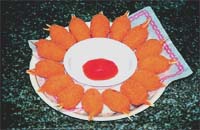 �It is very healthy,� says Arjun. Sugar and phosphates are added to it so that it gels well and stays under refrigeration. �That is the raw material, the surimi,� adds Arjun. After that comes the second stage in the factory where flavour and texture go hand-in-hand. �They have to be in harmony. A good quality surimi with high gel strength can manipulate the texture for the final product.�
The surimi is cut with high-speed cutters so that the chains of protein get broken. This goes into the molecular level. Salt is added so that it becomes a sticky gel. The protein cells are ready to imbibe anything that is added to them. Gelling agents, flavouring, seasonings are added, then the surimi is cooled into a ribbon sheet, cut to the desired length, it has a stick like appearance but is nice and flaky shredded meat. It is pasteurised, vacuum packed, frozen and kept in storage, then shipped to
different destinations.
�It is very healthy,� says Arjun. Sugar and phosphates are added to it so that it gels well and stays under refrigeration. �That is the raw material, the surimi,� adds Arjun. After that comes the second stage in the factory where flavour and texture go hand-in-hand. �They have to be in harmony. A good quality surimi with high gel strength can manipulate the texture for the final product.�
The surimi is cut with high-speed cutters so that the chains of protein get broken. This goes into the molecular level. Salt is added so that it becomes a sticky gel. The protein cells are ready to imbibe anything that is added to them. Gelling agents, flavouring, seasonings are added, then the surimi is cooled into a ribbon sheet, cut to the desired length, it has a stick like appearance but is nice and flaky shredded meat. It is pasteurised, vacuum packed, frozen and kept in storage, then shipped to
different destinations.
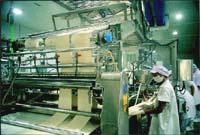 According to Arjun, the surimi analogue production is a revelation for people who love seafood. It has given them unique options that are not just healthy but also tasty. �These imitation products are convenience foods, they are vacuum packed and have long shelf lives. At home, in the deep freeze, they remain for eight weeks. France makes nutritional food for kids out of them. Their taste can be made sweet. France calls them �minis�. They are tiny sticks, sweet, and targeted at kids. Then there is a lobster-flavoured surimi that chefs add to salads. It has a flaky texture and food feeling in the mouth. And Spain has developed a baby eel imitation out of surimi,� says Arjun.
According to Arjun, the surimi analogue production is a revelation for people who love seafood. It has given them unique options that are not just healthy but also tasty. �These imitation products are convenience foods, they are vacuum packed and have long shelf lives. At home, in the deep freeze, they remain for eight weeks. France makes nutritional food for kids out of them. Their taste can be made sweet. France calls them �minis�. They are tiny sticks, sweet, and targeted at kids. Then there is a lobster-flavoured surimi that chefs add to salads. It has a flaky texture and food feeling in the mouth. And Spain has developed a baby eel imitation out of surimi,� says Arjun.